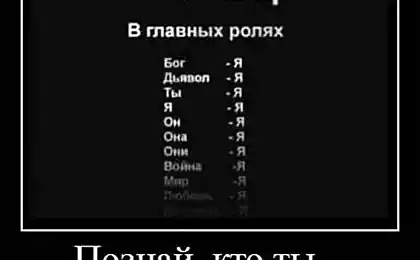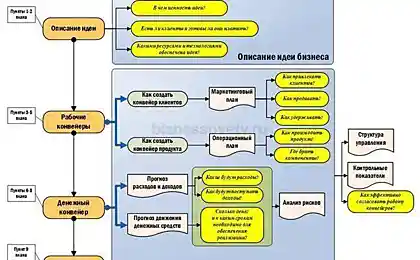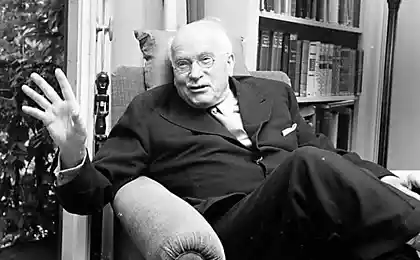576
10 great writing practices for self-discovery and not only
You've probably heard about the famous morning pages, invented by American writer Julia Cameron. Get up early and write three pages full of text, getting to entrenched deep thoughts is very interesting and useful for understanding yourself, setting goals and talents, to cleanse the brain of unnecessary information. But not all are 40-50 minutes in the morning to continuously sit and write down everything that comes to mind.
Did you know that the morning pages are just one of the many writing practices? There was a well-written therapy Institute (Therapeutic Writing Institute)? If you have the desire to work on yourself, to understand yourself, but time is sorely lacking, practice-five are the perfect solution.
In this article I have selected for example ten writing practices. But before we go any further, I should mention safety.
The written word is always very powerful tool. If you are experiencing severe depression, when everything goes wrong, are in the stage of post-traumatic stress disorder, if you can't switch from the initiated process, not hearing even a call timer — writing practices it is better to wait.
In any case, until you lay out a sheet of paper and grab a pencil, read a detailed description of safety. And, of course, is one of the indispensable conditions is true: everything that you written, should not be accessible to anyone except you. The guarantee that no one will read the result, gives to open up and admit to yourself what others never admit it. And what, in fact, no one but himself and God, and no need to confess.
In the post we all somehow seek to delve into self-knowledge. Discover some new facets of the soul, dig up the Lord's talents. Writing practice is one of the tools that can help in this difficult matter.
Morning settings
If the morning pages can afford not everyone, that morning settings — ideal for the busy from the Wake up people.
Well, if on the bedside table there will be a Notepad and pencil (or pen) to immediately after waking up doesn't need to go and get them, wasting time. Start the timer for 5 minutes and briefly formulated, as we would like to spend the coming day. Planning in a free form, almost dreaming. For simplicity, we can take as a basis one of the following phrases:
"Today I want..."
"I'll be careful..."
"I know I can stop today, and I..."
"And I want to think/to dream/to clarify for themselves..."

Lists
We all, one way or another, I write lists. What to buy, what to do, where to go. But lists can be used much wider! For example, why not write a list of ways to take care of themselves? The list of activities that bring elation? The list of activities, which is already very tired and wanted to stop (for example, spend several hours a day on social networks)? And to not go into an infinite enumeration, you can limit yourself with the timer on time. Do you know how many interesting things you can learn about yourself in 5 minutes?

Clusters
Fashionable methods of the schematic image information by using clusters can be very useful in self-knowledge.
Invent a concept that would like to explore in relation to themselves. For example, the word "joy." Tracing it in a frame. And then write the first Association with the word "joy" that came to mind. Tracing in a frame and connected to the first word. Then catch the Association with the second word, then you can return to the first (or to continue the chain). The result is quite branchy structure to help you assess your personal "map" of the relationship to the initial concept. What discoveries you can make by looking at this map?
To make the clusters are also on a timer, but you can — until you feel the exhaustion of the topic, its completeness.

"Seed"
This technique is good only in that case when in life are no sharp stress. If we evaluate the level of stress on a 10-point scale, the level should not exceed 6-7.
In the form of "seed" can be any word or phrase to the poem. But the most practical and simple "seed" in the form of a question. Ask a question about something important to you. For example: "What are the problems that worried me a year ago, quickly lost relevance?". Or: "the role I played in my life X until we stopped to chat?". Questions can be anything.

The wheel of life
You may have seen these beautiful scheme similar whether the graphs of the weather, whether on the mandala. The space is divided into eight sectors: household, business, finances, health, communication with family and friends, relationship with your loved one, religion/self-development, leisure and entertainment. The next step to note our satisfaction with a particular area. What are we contented, the farther from the point of intersection of the axes set point.
We offer you to pay attention to the three most developed and satisfying field. Three points can be spend a plane! It is your support, what helps to keep.
2-3 the weakest region, it would be good not to start, but hard to develop them will not work. This kind of black holes that could "eat" a lot of effort and did not give any result. So, one should focus on solving those issues that are in the area: "the effort produced impressive results."
Four lines, eight dots and so much certainty!

The questionnaire for themselves
With this technique it is possible to start with writing practices. To assess your or not.
Tuning in to what would like to write to complete the sentence:
"Today I'd like to explore..."
After determining the theme, you can start thinking (each — not more than two sentences):
"The first thing that comes to mind is ..."
"Beneath the surface I find..."
"I was in this annoying, bothering, annoying..."
"I was in this encouraging and inspiring..."
"I would be useful..."
"My next step..."
And then proofread and mark (also in writing), what new thoughts you've visited.

Autobiography in five minutes
Putting the timer on 5 minutes, try to write his biography. And then carefully read the resulting. What was the focus during these five minutes? Which, as you can see from written, lacking in your life?
Putting the timer again, try again.

A diary of personal and professional growth
Suppose, you are a lucky person who has the time, but something else is missing. Then you can be an interesting practice, proposed by the students-psychologists of Massey University in New Zealand. They were recording during the semester, and approximately every three months has given his supervisor a reflective essay the results of these records.
On the inside cover of the notebook is recommended to record the questions:
1. What did I do well?
2. What does that say about what is important to me? What are my skills?
3. What would I have to do differently?
4. What do I need to learn?
Every time when this list of questions, you can evaluate the work done and from a practical point of view look at self-improvement.
To record the findings (and to write what is the reflective essay of 2-3 pages), can be written to answer the following questions:
1. What topics are repeated?
2. What is missing from what should it be?
3. What changes have occurred in the records?
4. What became more important?
5. What was less important?
6. How things have changed since your perception and understanding of the situation?
7. How has your idea of what it means to "be professional"?
8. You became more confident?
9. What situations do you become better?
Work best on a timer and set it for a comfortable for you time (you can start with five minutes).
The number of studies using this writing practice is huge! Especially for those people who conduct scientific activities or participate in long-term projects.

Descriptive letter of good
Each of us has memories of events that took very little time — seconds! but seared in the heart with happiness. And maybe we even can't understand why so much joy in those moments, we may even think, "I had no right to feel" — but those moments were. And they can be a powerful "charging" and momentum for moving forward.
Take a sheet of paper (or open a new text file). Set a timer for 20 minutes.
Recall that moment. Make a note of everything, every detail. You can start with a General description, like if you wanted to give the reader a cinematic view of the action. Tell us about all that at that moment you could see, hear, and feel. The smells, the play of light, the trembling of the knees and hedgehogs in the stomach. Remember and describe.

Reflexive response
After each writing practice please write a reflective response. Take a step to the side and answer the questions: how was it? What I was to write on this subject? What did I learn during these 5-10-20 minutes? What conclusions can I make?..
The reflexive response itself can be good writing practice. After the working day. After the meeting. After the Liturgy. After any event happening regularly. Step back, take a look at how it was, set a timer for 10-15 minutes and write down.
Guaranteed: you will discover many new things!

Good luck and exciting discoveries! published
Author: Julia Gaididei P. S. And remember, only by changing their consumption — together we change the world! © Join us at Facebook , Vkontakte, Odnoklassniki
Source: www.matrony.ru/10-pismennyih-praktik-dlya-samopoznaniya-i-ne-tolko/
Did you know that the morning pages are just one of the many writing practices? There was a well-written therapy Institute (Therapeutic Writing Institute)? If you have the desire to work on yourself, to understand yourself, but time is sorely lacking, practice-five are the perfect solution.
In this article I have selected for example ten writing practices. But before we go any further, I should mention safety.
The written word is always very powerful tool. If you are experiencing severe depression, when everything goes wrong, are in the stage of post-traumatic stress disorder, if you can't switch from the initiated process, not hearing even a call timer — writing practices it is better to wait.
In any case, until you lay out a sheet of paper and grab a pencil, read a detailed description of safety. And, of course, is one of the indispensable conditions is true: everything that you written, should not be accessible to anyone except you. The guarantee that no one will read the result, gives to open up and admit to yourself what others never admit it. And what, in fact, no one but himself and God, and no need to confess.
In the post we all somehow seek to delve into self-knowledge. Discover some new facets of the soul, dig up the Lord's talents. Writing practice is one of the tools that can help in this difficult matter.
Morning settings
If the morning pages can afford not everyone, that morning settings — ideal for the busy from the Wake up people.
Well, if on the bedside table there will be a Notepad and pencil (or pen) to immediately after waking up doesn't need to go and get them, wasting time. Start the timer for 5 minutes and briefly formulated, as we would like to spend the coming day. Planning in a free form, almost dreaming. For simplicity, we can take as a basis one of the following phrases:
"Today I want..."
"I'll be careful..."
"I know I can stop today, and I..."
"And I want to think/to dream/to clarify for themselves..."

Lists
We all, one way or another, I write lists. What to buy, what to do, where to go. But lists can be used much wider! For example, why not write a list of ways to take care of themselves? The list of activities that bring elation? The list of activities, which is already very tired and wanted to stop (for example, spend several hours a day on social networks)? And to not go into an infinite enumeration, you can limit yourself with the timer on time. Do you know how many interesting things you can learn about yourself in 5 minutes?

Clusters
Fashionable methods of the schematic image information by using clusters can be very useful in self-knowledge.
Invent a concept that would like to explore in relation to themselves. For example, the word "joy." Tracing it in a frame. And then write the first Association with the word "joy" that came to mind. Tracing in a frame and connected to the first word. Then catch the Association with the second word, then you can return to the first (or to continue the chain). The result is quite branchy structure to help you assess your personal "map" of the relationship to the initial concept. What discoveries you can make by looking at this map?
To make the clusters are also on a timer, but you can — until you feel the exhaustion of the topic, its completeness.

"Seed"
This technique is good only in that case when in life are no sharp stress. If we evaluate the level of stress on a 10-point scale, the level should not exceed 6-7.
In the form of "seed" can be any word or phrase to the poem. But the most practical and simple "seed" in the form of a question. Ask a question about something important to you. For example: "What are the problems that worried me a year ago, quickly lost relevance?". Or: "the role I played in my life X until we stopped to chat?". Questions can be anything.

The wheel of life
You may have seen these beautiful scheme similar whether the graphs of the weather, whether on the mandala. The space is divided into eight sectors: household, business, finances, health, communication with family and friends, relationship with your loved one, religion/self-development, leisure and entertainment. The next step to note our satisfaction with a particular area. What are we contented, the farther from the point of intersection of the axes set point.
We offer you to pay attention to the three most developed and satisfying field. Three points can be spend a plane! It is your support, what helps to keep.
2-3 the weakest region, it would be good not to start, but hard to develop them will not work. This kind of black holes that could "eat" a lot of effort and did not give any result. So, one should focus on solving those issues that are in the area: "the effort produced impressive results."
Four lines, eight dots and so much certainty!

The questionnaire for themselves
With this technique it is possible to start with writing practices. To assess your or not.
Tuning in to what would like to write to complete the sentence:
"Today I'd like to explore..."
After determining the theme, you can start thinking (each — not more than two sentences):
"The first thing that comes to mind is ..."
"Beneath the surface I find..."
"I was in this annoying, bothering, annoying..."
"I was in this encouraging and inspiring..."
"I would be useful..."
"My next step..."
And then proofread and mark (also in writing), what new thoughts you've visited.

Autobiography in five minutes
Putting the timer on 5 minutes, try to write his biography. And then carefully read the resulting. What was the focus during these five minutes? Which, as you can see from written, lacking in your life?
Putting the timer again, try again.

A diary of personal and professional growth
Suppose, you are a lucky person who has the time, but something else is missing. Then you can be an interesting practice, proposed by the students-psychologists of Massey University in New Zealand. They were recording during the semester, and approximately every three months has given his supervisor a reflective essay the results of these records.
On the inside cover of the notebook is recommended to record the questions:
1. What did I do well?
2. What does that say about what is important to me? What are my skills?
3. What would I have to do differently?
4. What do I need to learn?
Every time when this list of questions, you can evaluate the work done and from a practical point of view look at self-improvement.
To record the findings (and to write what is the reflective essay of 2-3 pages), can be written to answer the following questions:
1. What topics are repeated?
2. What is missing from what should it be?
3. What changes have occurred in the records?
4. What became more important?
5. What was less important?
6. How things have changed since your perception and understanding of the situation?
7. How has your idea of what it means to "be professional"?
8. You became more confident?
9. What situations do you become better?
Work best on a timer and set it for a comfortable for you time (you can start with five minutes).
The number of studies using this writing practice is huge! Especially for those people who conduct scientific activities or participate in long-term projects.

Descriptive letter of good
Each of us has memories of events that took very little time — seconds! but seared in the heart with happiness. And maybe we even can't understand why so much joy in those moments, we may even think, "I had no right to feel" — but those moments were. And they can be a powerful "charging" and momentum for moving forward.
Take a sheet of paper (or open a new text file). Set a timer for 20 minutes.
Recall that moment. Make a note of everything, every detail. You can start with a General description, like if you wanted to give the reader a cinematic view of the action. Tell us about all that at that moment you could see, hear, and feel. The smells, the play of light, the trembling of the knees and hedgehogs in the stomach. Remember and describe.

Reflexive response
After each writing practice please write a reflective response. Take a step to the side and answer the questions: how was it? What I was to write on this subject? What did I learn during these 5-10-20 minutes? What conclusions can I make?..
The reflexive response itself can be good writing practice. After the working day. After the meeting. After the Liturgy. After any event happening regularly. Step back, take a look at how it was, set a timer for 10-15 minutes and write down.
Guaranteed: you will discover many new things!

Good luck and exciting discoveries! published
Author: Julia Gaididei P. S. And remember, only by changing their consumption — together we change the world! © Join us at Facebook , Vkontakte, Odnoklassniki
Source: www.matrony.ru/10-pismennyih-praktik-dlya-samopoznaniya-i-ne-tolko/























